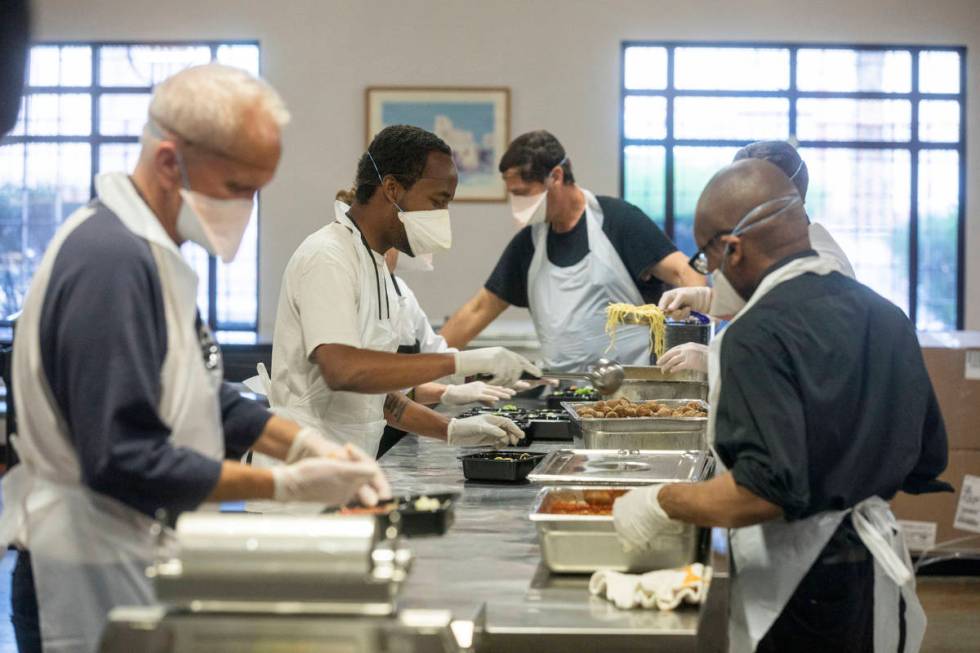Las Vegas nonprofit sees ‘unprecedented’ demand for senior meals

The coronavirus pandemic has created a “perfect storm” for Catholic Charities of Southern Nevada — a drop in donations and a surge in seniors seeking home-delivered meals — its CEO said.
The Las Vegas nonprofit used to have about 300 people on a waiting list for its free Meals on Wheels program. Within the past month, that jumped to about 2,400.
“In my eight years at Catholic Charities, that’s unprecedented,” President and CEO Tom Roberts said, adding that donations have dropped about 50 percent.
“There are a lot of people who are really struggling,” he said.
Even before the COVID-19 outbreak, Las Vegas Valley nonprofits were seeing an increase in the number of seniors seeking food assistance because of the booming population and longer lifespans.
Nevada was the fastest-growing state in the nation in 2018, according to the U.S. Census Bureau. And its population of retirement-age residents grew by 149,000 between 2010 and 2018.
Of Las Vegas’ nearly 645,000 residents, 14.5 percent are 65 or older, according to a July 2018 population estimate from the Census Bureau. The percentage is higher for Nevada as a whole (15.7 percent), Henderson (19.1 percent) and Boulder City (30.4 percent), but lower in North Las Vegas (10 percent).
Seniors on a fixed income struggle with food insecurity more than other age groups, said Jodi Tyson, vice president for strategic initiatives at Three Square food bank. They’re often forced to think about “spending trade-offs,” she said, in order to pay for necessities such as medication and housing.
Nationwide, the COVID-19 outbreak raises the risk of poor nutrition and poor health among the elderly, according to a Monday statement from the nonpartisan coalition Defeat Malnutrition Today.
“Malnutrition leads to more health-related complications and falls for older Americans, while protein malnutrition in particular contributes to longer hospital stays and higher rates of death,” national coordinator Bob Blancato said in the statement. “Working together, we must all do our part to protect the older adults in our lives from becoming malnourished during this crisis.”
Meals on Wheels
Catholic Charities’ Meals on Wheels program has served seniors in Las Vegas and North Las Vegas since 1975.
When Roberts arrived eight years ago at the nonprofit, 750 seniors were signed up for Meals on Wheels. Now, there are 2,200.
Typically, 200 to 300 people are on the waiting list. As a result, case managers prioritize the list based on need, with preference given to seniors who are immobile or have other serious health issues.
“The program, sadly, has always had a waiting list,” Roberts said. “… It breaks my heart that that level of demand and need is out there.”
Seniors, he said, are often “silent sufferers.”
Roberts said Catholic Charities has contacted the Nevada Department of Health and Human Services’ Aging and Disability Services Division, one of the agencies that provides funding for Meals on Wheels, to talk about the recently increased demand.
Catholic Charities has faced other challenges within the past month. The nonprofit’s shelter, which usually accommodates about 516 men, closed for about a week after a homeless man and an employee tested positive for COVID-19. It reopened April 1.
Some employees have become ill, or their family members are sick, Roberts said.
“That has obviously strained our labor pool, so we are struggling to keep the product moving,” he said.
The nonprofit has asked employees in its other departments to help with Meals on Wheels.
“By the grace of God and our employees, we haven’t missed a single meal,” Roberts said.
Other Meals on Wheels programs in Southern Nevada are operated by the city of Henderson and the Boulder City Senior Center. And some senior centers now provide delivery or pickup meals.
Boulder City’s program serves 30 to 60 seniors, a number that has stayed “pretty much the same” during the outbreak, said Lacey Scarpa, assistant executive director at the senior center.
The center is also delivering meals to more than 75 seniors outside of the program, and the number of people using its food pantry has doubled in the past month. The center used to serve in-person lunches to 120-150 seniors a day before it temporarily closed.
How other nonprofits are responding
In mid-March, Three Square food bank started seeing an influx of calls from people looking for food assistance. Initially, there were seven phone lines, but nine more were added.
Pre-COVID-19, Three Square’s phone center received about 15,000 calls each month. From March 16-20 — the week Gov. Steve Sisolak ordered the closure of nonessential businesses — it received 9,333 calls.
“A good portion of those were seniors who were afraid to go out of their homes,” Tyson said.
In response to the economic effects of the COVID-19 outbreak — including furloughs and layoffs — Three Square created an emergency food fund in partnership with the Clark County School District and launched 43 distribution sites across the valley.
The nonprofit’s Golden Groceries program provides some food distribution sites with dedicated hours for those 60 and older.
The nonprofit also called seniors who attended its two in-person meal programs to see if they needed home-delivered groceries. It has delivered groceries to about 1,600 seniors since mid-March through a partnership with the Regional Transportation Commission.
And the nonprofit expects to refer 1,600 to 2,000 seniors to home-delivered meal programs administered by other agencies, Tyson said.
At SHARE Village Las Vegas, food pantry services have expanded to seven days a week because of increased demand.
“I’m very, very concerned about our community,” the nonprofit’s founder, Arnold Stalk, said, “and was before this whole thing hit.”
Contact Julie Wootton-Greener at jgreener@reviewjournal.com or 702-387-2921. Follow @julieswootton on Twitter.